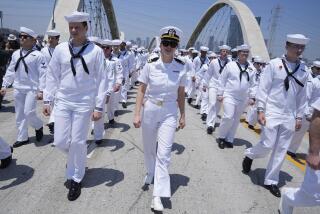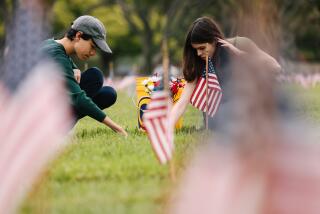Latinos Demonstrate Their Pride in Veterans of Persian Gulf War
- Share via
Veterans of the Persian Gulf War received an Olvera Street homecoming Sunday, as mariachi and folklorico dancers joined Latino community leaders to welcome back the men and women of Operation Desert Storm.
Several family members and returning soldiers referred to the sense of orgullo , or pride, they felt for those who served in the Gulf War. Cries of “That’s my dad!” and “ Es mi hijo (It’s my son!)” floated through the crowd when a group of soldiers from all branches of the military marched toward a gazebo in the center of the plaza.
Some onlookers, like 19-year-old Adriana Alvarez, were welcoming back family members who had been away for months. Alvarez said her father, Rodolfo, arrived Thursday night at Los Angeles International Airport after spending eight months in the Gulf.
For the last few days, she has been helping him celebrate. “We’ve been partying all weekend,” Alvarez said with a laugh, while her father joined other soldiers in thanking the crowd for its support.
“It’s a tremendous feeling to be home,” said Rodolfo Alvarez, a 1st sergeant in the 101st Airborne Division. Alvarez, who has been in the military for 19 years, said his unit set up a roadblock near a city between Baghdad and Kuwait on a road “just like a stretch of the 101 freeway.”
Now Alvarez is back amid L.A. traffic hassles for a monthlong vacation. He said he returns to Ft. Campbell, Ky., in May.
Sunday’s celebration also honored Latino veterans of all wars, including Vietnam vets, many of whom faced ridicule and indifference when they came home two decades ago.
“We looked at the Vietnam experience and the fact that we didn’t acknowledge their contributions,” said Los Angeles City Councilman Richard Alatorre, who organized the event with groups such as the American GI Forum and Veterans in Community Service. “We can’t afford to make the same mistake.
“This is an opportunity to say thank you, and much more importantly, to recommit ourselves,” Alatorre said, referring to the support services which returning veterans will need.
Vietnam veteran Edward Carrillo said he was worried about the returning soldiers who must readjust to civilian life. Carrillo stood quietly at a table advertising the Vet Center, a federal facility in East Los Angeles that is opening its doors to Gulf veterans for counseling, referrals and other services.
“They’ve got the fiesta,” Carrillo said, gesturing toward a crowd of people enjoying a mariachi performance. “But they’re coming back to a lot of the things we did--unemployment and family conflict.”
Carrillo said he attended the celebration to encourage returning soldiers to seek the help they need.
Another source of help is Support for Latino Military Families, which served more than 600 families during the war and is continuing its weekly counseling sessions. Bertha Sanchez, the founder of the group, said it is important for people to continue talking about their feelings.
“We know the war is over, but what about our fears still?” Sanchez said, adding that one of her sons is still serving in the Gulf. Activity at her Lincoln Heights center has slowed, but people still need support, she said.
Ruben Treviso, regional chairman of the American GI Forum, a national support group for Latino veterans, watched as soldiers hugged family members, laughed or ate churros and snow cones with friends.
“The guys are feeling good right now, but when the nightmares start coming. . . .” He trailed off, shaking his head. That’s why groups like his exist, he added.
More to Read
Sign up for Essential California
The most important California stories and recommendations in your inbox every morning.
You may occasionally receive promotional content from the Los Angeles Times.













